To print this article, all you need is to be registered or login on Mondaq.com.
Poland offers a straightforward and business-friendly
environment for cryptocurrency operations, governed mainly by the
Polish Anti-Money Laundering and Terrorist Financing Law.
Until the Markets in Crypto-Assets (MiCA) Regulation comes into
force on December 30, 2024, businesses wishing to operate in
Poland’s crypto space must comply with existing laws, including
obtaining a Virtual Asset Service Provider (VASP)
license.
Below, we outline the current regulatory framework, benefits of
obtaining a crypto license in Poland, and insights into the
evolving market.
Current Cryptocurrency Licensing Requirements in Poland
To provide crypto-related services in Poland, entities must
register in the Register of Virtual Currency
Activities and obtain a VASP license.
Licensed VASPs can offer services such as:
- Exchange between virtual currencies and fiat money (e.g., EUR
to BTC, BTC to USD), - Exchange between virtual currencies (e.g., BTC to ETH),
- Intermediation in crypto exchange services mentioned
above, - Custody services, including providing crypto wallets (on-ramp,
off-ramp).
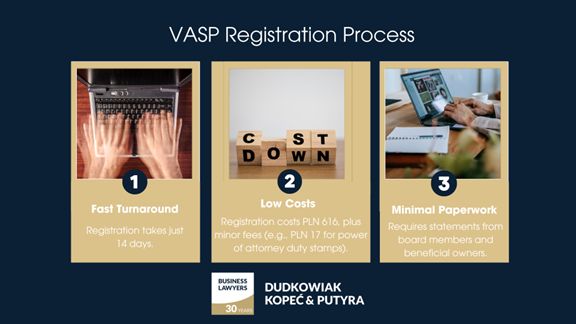
VASP Registration Process
- Fast Turnaround: Registration takes just 14
days. - Low Costs: Registration costs PLN 616, plus
minor fees (e.g., PLN 17 for power of attorney duty stamps). - Minimal Paperwork: Requires statements from
board members and beneficial owners.
Why Obtain a VASP License in Poland?
Poland provides a dynamic ecosystem for cryptocurrency
investments, featuring a tech-savvy workforce, growth-oriented
population and competitive registration costs. Here’s why
obtaining a VASP license in Poland is advantageous:
- Legal Operations: Operate legally and gain the
trust of investors and partners. - Market Growth: Tap into Poland’s growing
cryptocurrency market, the largest financial services market in
Central and Eastern Europe (CEE). - Business Expansion: Collaborate with financial
institutions and payment providers. - Future-Ready: under certain conditions VASPs
registered before December 30, 2024, can operate under their VASP
license until transitioning into the new CASP license introduced by
MiCA regulations.
The Growing Crypto Market in Poland
According to the FinTech Foundation Report 2023, Poland’s
FinTech sector is thriving and poised for further expansion.
As of November 2024, there are more than 1,600 entities
actively registered as VASPs. However, not all registered
companies are operational, creating room for new market
entrants.
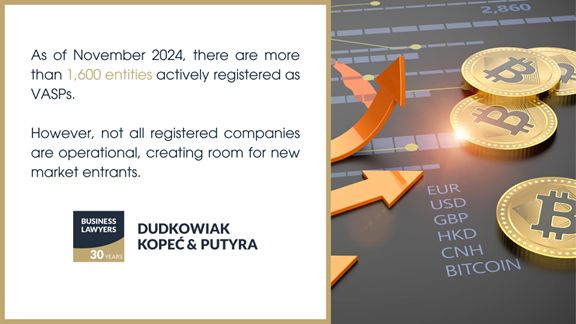
Transition to CASP License Under MiCA
From December 30, 2024, companies offering crypto services in
the EU must obtain a Crypto Asset Service Provider (CASP)
license. This license ensures compliance with MiCA
regulations and provides passporting rights, allowing businesses to
operate seamlessly across the EU.
Key Differences Between VASP and CASP
Licenses
- VASP License: Currently required for crypto
operations in Poland. - CASP License: Mandatory from 2025, for
services across the EU, with a grace period for existing
VASPs.
Services Requiring a CASP License
- Custody and management of crypto assets on behalf of
clients. - Operating trading platforms for crypto assets.
- Exchanging crypto-assets for fiat or other crypto-assets.
- Executing and managing purchase orders for crypto assets.
- Providing advice and portfolio management for crypto
assets. - Offering crypto-asset transfer services.
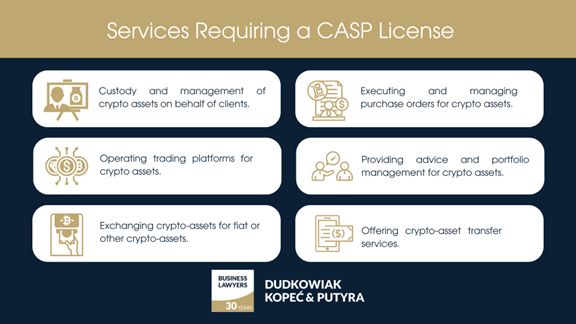
Seizing Opportunities in Poland’s Crypto Market: A
Strategic Call to Action
Poland’s proactive approach to cryptocurrency regulation,
combined with its robust FinTech ecosystem, positions it as an
attractive hub for crypto businesses. Whether you’re planning
to register as a VASP or prepare for MiCA compliance, the
opportunities in Poland’s crypto market are significant.
Act now to secure your VASP license and
establish a foothold in this growing market. With the transition to
CASP license under MiCA on the horizon, early compliance ensures
your business remains competitive and legally compliant.
CRYPTO LICENSE REQUIREMENTS IN POLAND: A COMPREHENSIVE
GUIDE
Poland’s evolving cryptocurrency regulatory framework sets
clear requirements for businesses aiming to
operate as virtual asset service providers (VASPs). Whether
you’re planning to engage in crypto trading, custody services,
or exchange operations, understanding the crypto license
requirements in Poland is essential for ensuring compliance
and maintaining business credibility.
Key Requirements for Obtaining a Crypto License in Poland
To register as a VASP and legally operate in Poland, companies
must meet two primary requirements: the no
criminal record requirement and the professional qualifications
requirement.
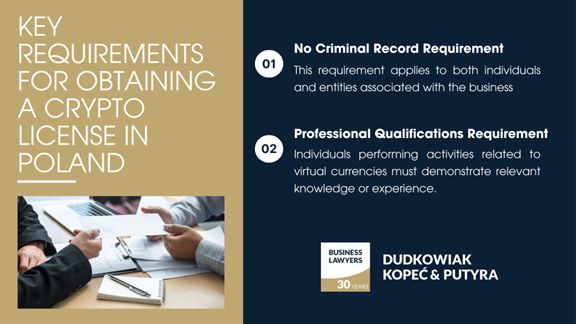
1. No Criminal Record Requirement
This requirement applies to both individuals and entities
associated with the business:
For Individuals (e.g., managing persons, beneficial
owners):
- Must not have been legally convicted of intentional crimes,
including: -
- Crimes against state institutions and local governments,
- Document fraud,
- Economic crimes,
- Terrorist financing,
- Intentional fiscal offenses.
For Entities:
- Shareholders, partners, or management members must not have any
criminal convictions related to the offenses outlined above.
2. Professional Qualifications Requirement
Individuals performing activities related to virtual currencies
must demonstrate relevant knowledge or experience. This can be
achieved by:
- Completing a training program or course covering legal and
practical aspects of virtual currency operations, or - Having at least one year of experience in virtual
currency-related activities, supported by relevant
documentation.
Entities fulfilling both requirements are eligible for
entry into the Register of Activities in the Field of Virtual
Currencies.
Post-Registration Obligations for Crypto Businesses in
Poland
After successfully registering as a VASP, companies must adhere
to several post-registration requirements under Polish law.
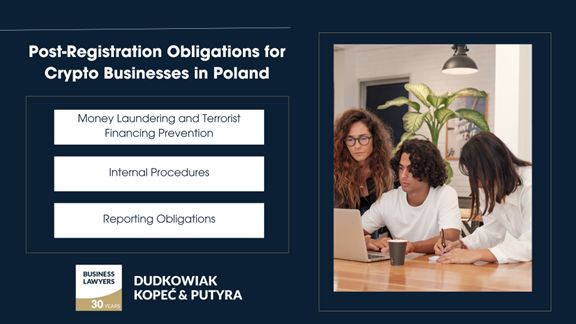
These include:
1. Money Laundering and Terrorist Financing
Prevention:
- Conducting risk assessments for money laundering and terrorist
financing. - Implementing financial security measures, such as:
-
- Customer identification and verification (KYC).
- Identifying and verifying the ultimate beneficial owner
(UBO). - Assessing business relationships and monitoring them
regularly.
2. Internal Procedures:
- Developing internal policies to counter money laundering and
terrorist financing.
3. Reporting Obligations:
- Notifying Polish authorities of specific / suspicious
transactions. - Cooperating with authorities when suspicious activities are
detected. - Submitting quarterly activity reports to the General Inspector
of Financial Information (GIIF) within 18 days of the end of each
calendar quarter.
Sanctions for Non-Compliance with Crypto Laws in Poland
Failure to comply with post-registration obligations can result
in significant administrative and financial penalties.
These include:
- Public disclosure of the entity’s illegal activities on the
Minister of Finance’s website. - Orders to cease specific activities.
- Removal from the Register of Virtual Currency Activities.
- Prohibition from holding managerial positions for up to one
year. - Financial penalties, which can amount to:
-
- Twice the benefit gained or loss avoided due to the violation,
or - Up to €1,000,000 if the benefit or loss cannot be
determined.
- Twice the benefit gained or loss avoided due to the violation,
Criminal Penalties:
Individuals acting on behalf of the entity which fails to notify
authorities of suspicious activities or provide false information
may face 3 months to 5 years of imprisonment.
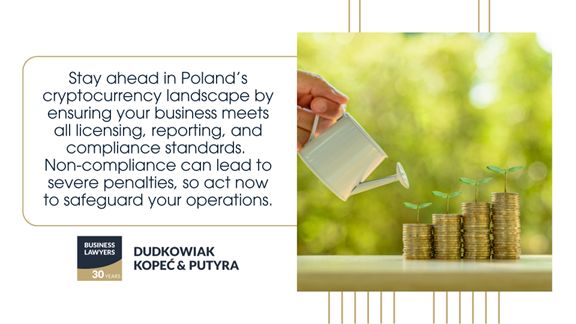
Why Compliance Matters for Crypto Businesses in Poland?
Adhering to Polish crypto regulations not only ensures legal
compliance but also boosts credibility with
partners and customers. By fulfilling registration and reporting
requirements, businesses can operate securely in Poland’s
growing cryptocurrency market, fostering trust and
long-term success.
Stay ahead in Poland’s cryptocurrency landscape by ensuring
your business meets all licensing, reporting, and compliance
standards. Non-compliance can lead to severe penalties, so act now
to safeguard your operations.
VASP Frequently Asked Questions
Is cryptocurrency activity legal in Poland?
Yes, cryptocurrency activity, including
transactions and business operations involving virtual assets,
is legal in Poland as long as there is no explicit
prohibition under Polish law. Businesses engaging in
cryptocurrencies must comply with relevant regulatory
requirements.
Is cryptocurrency activity legal in the European
Union?
Yes, cryptocurrency activity is
generally legal across the European Union. This was
confirmed by the Court of Justice of the European Union in its
ruling of October 22, 2015 (C-264/14). Cryptocurrency businesses
operating in the EU must adhere to local and EU-wide
regulations.
Is cryptocurrency business supervised by Polish
financial authorities?
Currently, cryptocurrency businesses are not classified
as part of the financial market under Polish law and are
therefore not subject to direct financial supervision. However, the
authority responsible for maintaining the Register of Virtual
Currencies may inspect VASPs to ensure compliance with registration
requirements. This situation will change along with application of
MiCA regulation.
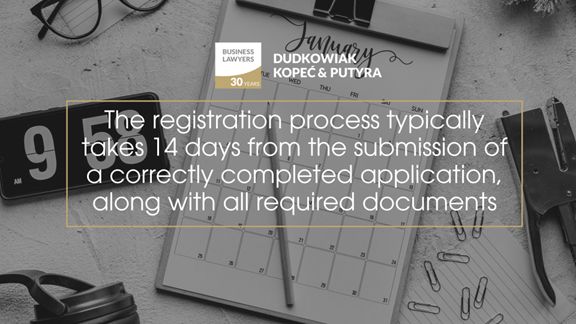
How long does the crypto registration process in Poland
take?
The registration process typically takes 14
days from the submission of a correctly completed
application, along with all required documents. The Director of the
Tax Administration Chamber in Katowice, under the authority of the
Minister of Finance, handles the registration process.
What are the reasons for a crypto license application to
be denied?
Polish authorities may deny a crypto license
application under several circumstances,
including:
- Incomplete applications that are not corrected within the given
timeframe. - Inconsistent or false information in the application.
- Legally binding decisions prohibiting the applicant from
conducting the proposed business activity.
What can I do if my crypto license application is
denied?
If your application is denied, you can:
1. Request reconsideration of your case by the
Minister of Finance.
2. File an appeal with the competent Regional
Administrative Court for further review.
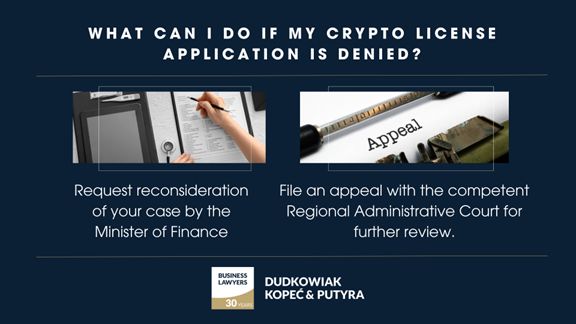
Are there any specific post-registration obligations for
virtual currency businesses in Poland?
Yes, crypto businesses must comply with
several post-registration obligations,
including:
- Identifying and assessing money laundering and terrorist
financing risks. - Implementing financial security measures such as customer
identification and ongoing monitoring of transactions. - Developing internal policies to combat money laundering and
terrorist financing. - Submitting quarterly reports to the General Inspector of
Financial Information (GIIF). - Cooperating with Polish authorities in cases of suspicious
activities.
Can post-registration obligations be outsourced to third
parties?
Yes, certain obligations, such as financial
security measures and reportings, can be outsourced to
third parties. However, outsourcing does not absolve the
business owner of their legal responsibility for compliance.
What are the penalties for failing to comply with
post-registration obligations?
Non-compliance with post-registration obligations can result in
administrative penalties, including:
- Public disclosure of the violation on the Minister of
Finance’s website. - Orders to cease specific activities.
- Removal from the Register of Virtual Currency Activities.
- A prohibition on holding managerial positions for up to one
year. - Financial penalties of up to €1,000,000 or twice the
financial benefit gained from the violation.
Criminal Liability: Individuals acting on
behalf of non-compliant businesses may face imprisonment ranging
from 3 months to 5 years.
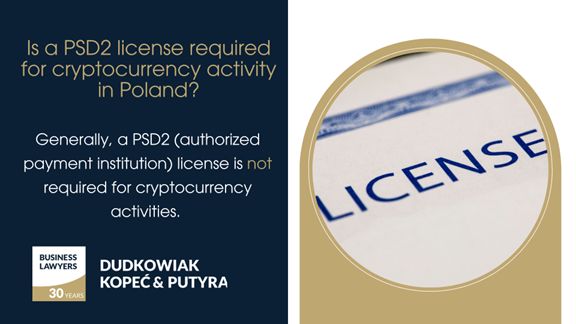
Is a PSD2 license required for cryptocurrency activity
in Poland?
Generally, a PSD2 (authorized payment institution) license
is not required for cryptocurrency activities.
However, if your crypto business includes payment services, you may
need to obtain either an authorized payment institution license
(KIP) or a small payment institution license (MIP), depending on
the scope of services.
The content of this article is intended to provide a general
guide to the subject matter. Specialist advice should be sought
about your specific circumstances.
